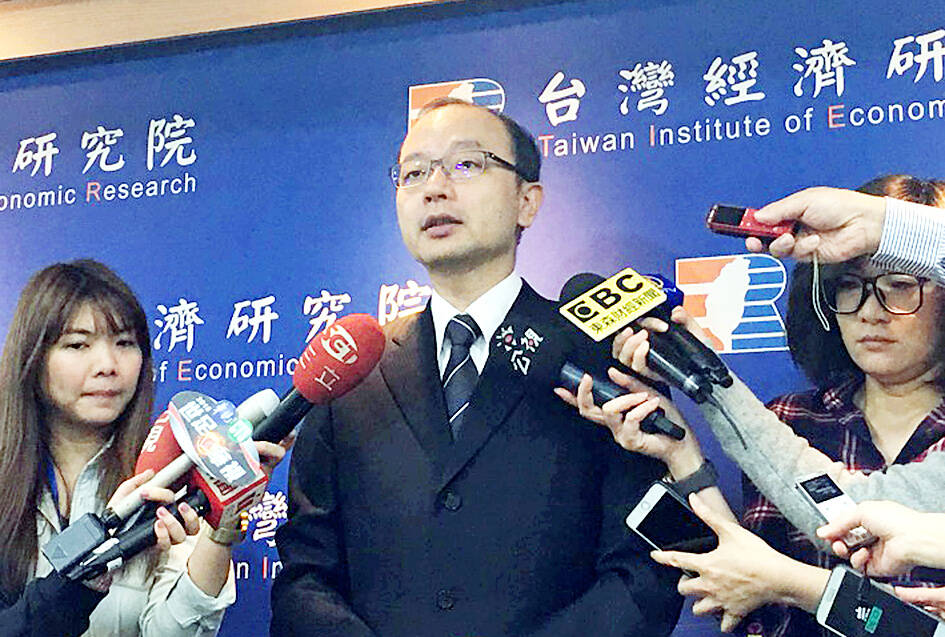Business sentiment last month remained listless among local manufacturers due to continued weak end-market demand, but a sizeable number are looking at business picking up ahead, as the high sales season for technology products approaches, the Taiwan Institute of Economic Research (TIER, 台灣經濟研究院) said yesterday.
The confidence gauge for the manufacturing industry was 89.3, shedding 2.02 points from April, as inventory adjustments lingered, TIER Economic Forecasting Center director Gordon Sun (孫明德) said.
However, the ratio of companies with positive views increased by 4.6 percentage points to 29.9 percent, while companies with a gloomy outlook fell by 0.7 percentage points to 24.4 percent, the monthly survey said.

Photo: CNA
Food, leisure and printing product manufacturers were upbeat, while suppliers of chemical, machinery and metal products, as well as transportation tools, were conservative, TIER said.
International research bodies recently raised GDP growth forecasts for the world, the US and Japan, lending support for the sentiment upturn, Sun said, adding that global firms also breathed a sigh of relief after the US Federal Reserve moved to keep interest rates unchanged.
“The worst is likely over, but it remains to be seen when the process of bottom building will come to an end and usher in a meaningful recovery,” Sun said.
The nation’s key economic barometers stay in negative territory, but their pace of decline has slowed down, he said.
Specifically, local firms in Apple Inc’s supply chains might benefit from its upcoming release of new iPhone series, and other electronics suppliers would enjoy growing demand for electric vehicles and artificial intelligence applications, the institute said.
Global technology brands might adopt a cautious approach to inventory building this time on concern inflation remains high, boding ill for spending on technology gadgets, Sun said.
Private consumption economic data appear to be the strongest, in light of robust retail revenue and auto sales, explaining why the business confidence among service providers edged up 0.57 points to 99.14, TIER found.
The rallies in the local bourse and foreign tourist arrivals helped drive up private consumption, Sun said.
Retailers, wholesale operators, restaurants, logistics and warehousing service providers are looking at continued business improvement in the coming six months, the institute said.
By contrast, construction companies and real-estate brokers stalled, as they remain under cost pressures despite raw material price declines, it said.
Furthermore, demand for housing and industrial factories subsided amid unfavorable policy measures, TIER said.
As a result, the sentiment reading for construction and property sectors dropped by 0.95 points to 93.47, it said.

Taiwan Semiconductor Manufacturing Co (TSMC, 台積電) would not produce its most advanced technologies in the US next year, Minister of Economic Affairs J.W. Kuo (郭智輝) said yesterday. Kuo made the comment during an appearance at the legislature, hours after the chipmaker announced that it would invest an additional US$100 billion to expand its manufacturing operations in the US. Asked by Taiwan People’s Party Legislator-at-large Chang Chi-kai (張啟楷) if TSMC would allow its most advanced technologies, the yet-to-be-released 2-nanometer and 1.6-nanometer processes, to go to the US in the near term, Kuo denied it. TSMC recently opened its first US factory, which produces 4-nanometer

PROTECTION: The investigation, which takes aim at exporters such as Canada, Germany and Brazil, came days after Trump unveiled tariff hikes on steel and aluminum products US President Donald Trump on Saturday ordered a probe into potential tariffs on lumber imports — a move threatening to stoke trade tensions — while also pushing for a domestic supply boost. Trump signed an executive order instructing US Secretary of Commerce Howard Lutnick to begin an investigation “to determine the effects on the national security of imports of timber, lumber and their derivative products.” The study might result in new tariffs being imposed, which would pile on top of existing levies. The investigation takes aim at exporters like Canada, Germany and Brazil, with White House officials earlier accusing these economies of

Teleperformance SE, the largest call-center operator in the world, is rolling out an artificial intelligence (AI) system that softens English-speaking Indian workers’ accents in real time in a move the company claims would make them more understandable. The technology, called accent translation, coupled with background noise cancelation, is being deployed in call centers in India, where workers provide customer support to some of Teleperformance’s international clients. The company provides outsourced customer support and content moderation to global companies including Apple Inc, ByteDance Ltd’s (字節跳動) TikTok and Samsung Electronics Co Ltd. “When you have an Indian agent on the line, sometimes it’s hard

PROBE CONTINUES: Those accused falsely represented that the chips would not be transferred to a person other than the authorized end users, court papers said Singapore charged three men with fraud in a case local media have linked to the movement of Nvidia’s advanced chips from the city-state to Chinese artificial intelligence (AI) firm DeepSeek (深度求索). The US is investigating if DeepSeek, the Chinese company whose AI model’s performance rocked the tech world in January, has been using US chips that are not allowed to be shipped to China, Reuters reported earlier. The Singapore case is part of a broader police investigation of 22 individuals and companies suspected of false representation, amid concerns that organized AI chip smuggling to China has been tracked out of nations such